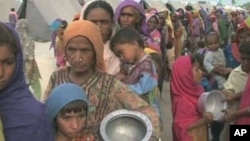The Pakistani government says nearly a month of heavy flooding has damaged more than 200 health facilities and displaced roughly a third of the country's 100,000 female health workers from their homes.
Several women huddle together as they walk down a row of tents for flood victims set up in the middle of the main roadway linking Pakistan's capital Islamabad to the northwestern city of Peshawar.
Their pristine white clothes complete with white scarves covering their hair, and in some cases their faces, offer a sharp contrast to the filthy condition of the flood victims walking or sitting aimlessly in the dust.
Watch Sean Maroney's Report:
These women are female health workers. They come in four vehicles from different areas to collect data for the government, mainly on the 40 to 50 pregnant women in the makeshift camp.
Gul Naz is one of the health workers. She tells VOA that they can only collect data because none of them are doctors. "We need at least one female doctor who could look into the problems of these pregnant women. Mere collection of data is not what is needed," she said.
Her colleague Arshad Begum says her job is most difficult when she sees the survivors' desperation. "They ask us to check them and they ask us to give them medicines, but we don't have that. We can only console them," she said.
The desperation extends from northwestern Khyber Paktunkhwa province to Pakistan's southern Sindh province, where new flooding has displaced one million more people since Wednesday.
Kanjo Mai is one of those affected. She is seven months pregnant and says her family, which includes four children, lost everything in the flood. "I don't have any food, and I am sick with pain all over my body," she said.
Dr. Saima Ismail is a gynecologist working with survivors in Sindh. She says there is an urgent need for female doctors. "The number of patients has increased by 60 to 80 percent. People come 24 hours a day. Most are coming with miscarriages, and some are going into labor early. Both the maternal and prenatal mortality rates have increased," she said.
Back outside Peshawar in Charsadda district, female health worker Arshad Begum tells VOA that her job is particularly difficult because of the conservative attitude of the area's predominantly Pashtun victims.
In fact, out of the roughly 500 families living along the roadway, most of the men have sent their women to live among themselves in tents set up in their destroyed homes.
"One of our colleagues is stuck here with the men to convince them to let us help their women. We have to some extent convinced them. But the problem is even we can't stay at this camp because some of the men make our jobs difficult by harassing us," said Arshad Begum.
The floods that began almost one month ago have devastated a large portion of Pakistan, starting in the mountainous northern reaches and shifting to the country's southern farmland. The disaster has killed an estimated 1,600 people and affected up to 20 million others.
Senior Pakistani officials say the instances of waterborne diseases, such as diarrhea, have increased in the weeks since the initial disaster, and have targeted the most vulnerable, including women, children and the elderly.
Watch Raw Footage of Pakistan's Flooding Situation:




